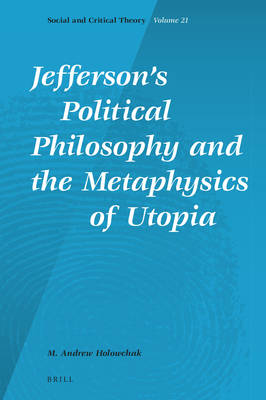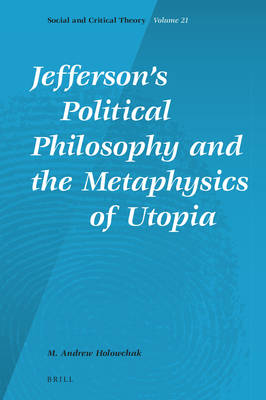
- Afhalen na 1 uur in een winkel met voorraad
- Gratis thuislevering in België vanaf € 30
- Ruim aanbod met 7 miljoen producten
- Afhalen na 1 uur in een winkel met voorraad
- Gratis thuislevering in België vanaf € 30
- Ruim aanbod met 7 miljoen producten
Zoeken
Jefferson's Political Philosophy and the Metaphysics of Utopia
M Andrew Holowchak
€ 213,95
+ 427 punten
Omschrijving
In Jefferson's Political Philosophy and the Metaphysics of Utopia, M. Andrew Holowchak traces the development of Jeffersonian republicanism as a political philosophy, though it is today seldom seen as a political philosophy, by examining the documents he wrote (e.g., Declaration, First Inaugural Address, and significant letters) and key literature he read. That political philosophy, fundamentally progressive and people-first, was driven by a vision of an "empire of liberty"--a global confederation of republican nations in moral and political partnership and peaceful coexistence--and was to take root in North America. Jefferson's vision influenced his domestic and foreign policies as president and the numerous letters he wrote after his presidency, but never took root there, or anywhere. Was that due to a defect of vision--a view of humans' capacities and goodness at odds with reality--or were historical forces at play which were antagonistic to the rooting and suckering of Jeffersonian republicanism?
Specificaties
Betrokkenen
- Auteur(s):
- Uitgeverij:
Inhoud
- Aantal bladzijden:
- 212
- Taal:
- Engels
- Reeks:
- Reeksnummer:
- nr. 21
Eigenschappen
- Productcode (EAN):
- 9789004339415
- Verschijningsdatum:
- 2/03/2017
- Uitvoering:
- Hardcover
- Formaat:
- Genaaid
- Afmetingen:
- 152 mm x 239 mm
- Gewicht:
- 453 g

Alleen bij Standaard Boekhandel
+ 427 punten op je klantenkaart van Standaard Boekhandel
Beoordelingen
We publiceren alleen reviews die voldoen aan de voorwaarden voor reviews. Bekijk onze voorwaarden voor reviews.








